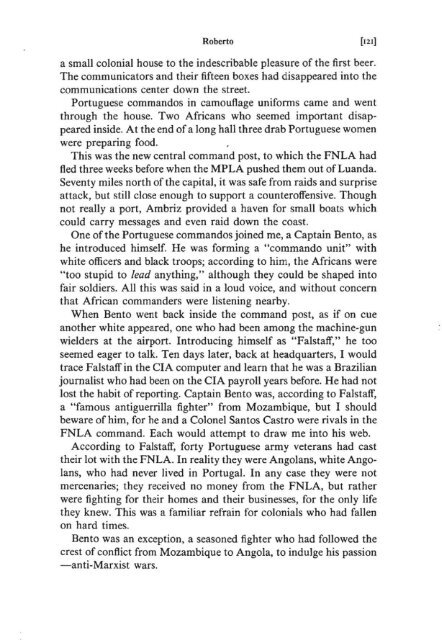In Search of Enemies - A CIA Story - John Stockwell
In Search of Enemies - A CIA Story - John Stockwell
In Search of Enemies - A CIA Story - John Stockwell
Create successful ePaper yourself
Turn your PDF publications into a flip-book with our unique Google optimized e-Paper software.
Roberto [121]<br />
a small colonial house to the indescribable pleasure <strong>of</strong> the first beer.<br />
The communicators and their fifteen boxes had disappeared into the<br />
communications center down the street.<br />
Portuguese commandos in camouflage uniforms came and went<br />
through the house. Two Africans who seemed important disappeared<br />
inside. At the end <strong>of</strong> a long hall three drab Portuguese women<br />
were preparing food.<br />
This was the new central command post, to which the FNLA had<br />
fled three weeks before when the MPLA pushed them out <strong>of</strong> Luanda.<br />
Seventy miles north <strong>of</strong> the capital, it was safe from raids and surprise<br />
attack, but still close enough to support a counter<strong>of</strong>fensive. Though<br />
not really a port, Ambriz provided a haven for small boats which<br />
could carry messages and even raid down the coast.<br />
One <strong>of</strong> the Portuguese commandos joined me, a Captain Bento, as<br />
he introduced himself. He was forming a "commando unit" with<br />
white <strong>of</strong>ficers and black troops; according to him, the Africans were<br />
"too stupid to lead anything," although they could be shaped into<br />
fair soldiers. All this was said in a loud voice, and without concern<br />
that African commanders were listening nearby.<br />
When Bento went back inside the command post, as if on cue<br />
another white appeared, one who had been among the machine-gun<br />
wielders at the airport. <strong>In</strong>troducing himself as "Falstaff," he too<br />
seemed eager to talk. Ten days later, back at headquarters, I would<br />
trace Falstaff in the <strong>CIA</strong> computer and learn that he was a Brazilian<br />
journalist who had been on the <strong>CIA</strong> payroll years before. He had not<br />
lost the habit <strong>of</strong> reporting. Captain Bento was, according to Falstaff,<br />
a "famous antiguerrilla fighter" from Mozambique, but I should<br />
beware <strong>of</strong> him, for he and a Colonel Santos Castro were rivals in the<br />
FNLA command. Each would attempt to draw me into his web.<br />
According to Falstaff, forty Portuguese army veterans had cast<br />
their lot with the FNLA. <strong>In</strong> reality they were Angolans, white Angolans,<br />
who had never lived in Portugal. <strong>In</strong> any case they were not<br />
mercenaries; they received no money from the FNLA, but rather<br />
were fighting for their homes and their businesses, for the only life<br />
they knew. This was a familiar refrain for colonials who had fallen<br />
on hard times.<br />
Bento was an exception, a seasoned fighter who had followed the<br />
crest <strong>of</strong> conflict from Mozambique to Angola, to indulge his passion<br />
- anti-Marxist wars.


